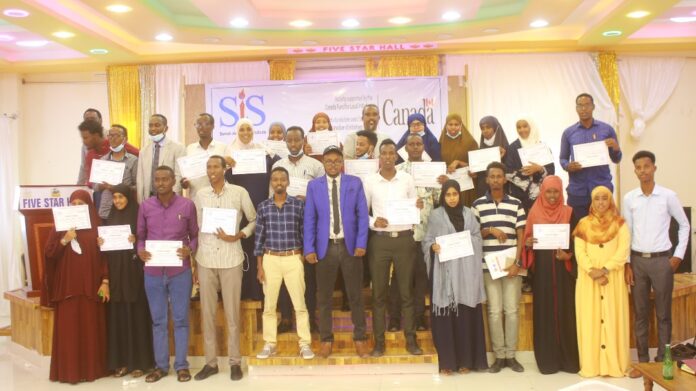MOGADISHU (KAAB TV) – Despite Somalia being one of the most perilous countries for journalists in Africa, Galkayo city was once known as the second deadliest place for media professionals in the country. But now this central Somalia city has emerged as a beacon of progress, witnessing a growing number of media houses and journalists operating in the region.
This success is now measured through successive trainings of the journalists and collaborations among local journalists and media defenders, as well as the engagement of the local community.
In September 2021, a ray of hope emerged when the Somali Journalists Syndicate (SJS) initiated a training program focused on safety and media freedom. This groundbreaking initiative brought together reporters from both sides of the divided city, aiming to foster collaboration and improve the security of the media community in the region. The results were nothing short of remarkable.
“We wanted to improve the dire security conditions for local journalists. We understood that a divided city cannot protect journalists. I am pleased to say that our efforts bore fruit, as journalists from all sides now feel secure and capable of carrying out their duties,” said Abdalle Ahmed Mumin, the Secretary-General of SJS. “When journalists are safe, the community also feels safer.”
The training program, supported by funding from the Canadian Government through its Global Affairs Canada Fund for Local Initiatives (CFLI), made a significant impact. A total of 141 journalists received training for a period of two years, with nearly half of them being female journalists, individuals from marginalized communities, and journalists with disabilities. The project encompassed participants from five regions in Somalia, including Mogadishu, Hirshabelle, Southwest, Puntland, Jubbaland, and Galmudug.
According to Mr. Mumin, the training sessions successfully addressed two crucial issues: raising awareness about the right to freedom of expression and enhancing the safety of journalists, both in physical and digital realms.
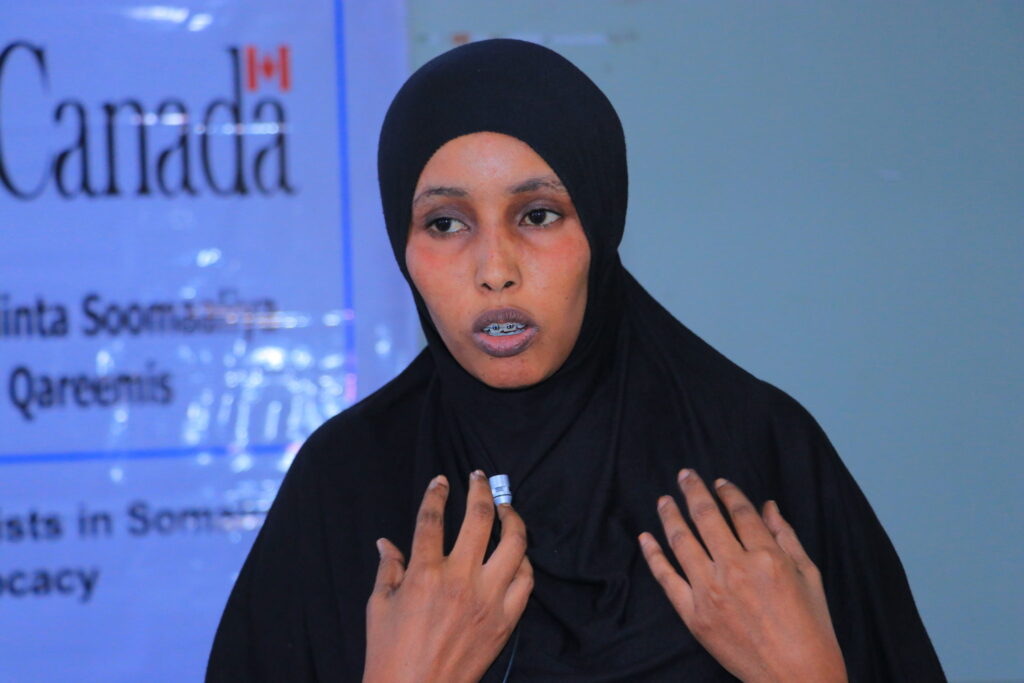
Zamira Abdi Ali from Puntland State TV also attested to the positive impact of the safety and security training, particularly for female journalists. Her approach and mindset shifted after the training, as she now conducts regular safety checks before assignments. “I am grateful to SJS and Canada for their support. I want to urge them that these successes we got from the trainings should be replicated in other regions so that many journalists across the country can be safe,” she added.
For years, Fadumo Mohamed Sharif in Jowhar had worked without any prior safety and security training, constantly aware of the risks associated with her profession due to the targeting of several journalists, including her colleagues, in the past. However, the SJS training proved to be a turning point in her career.
“The SJS training was the first of its kind for me. I couldn’t afford such training, and women often miss out on safety and security opportunities. Since completing the training, I have successfully undertaken several assignments. I diligently follow the instructions provided by the trainers,” she shared.
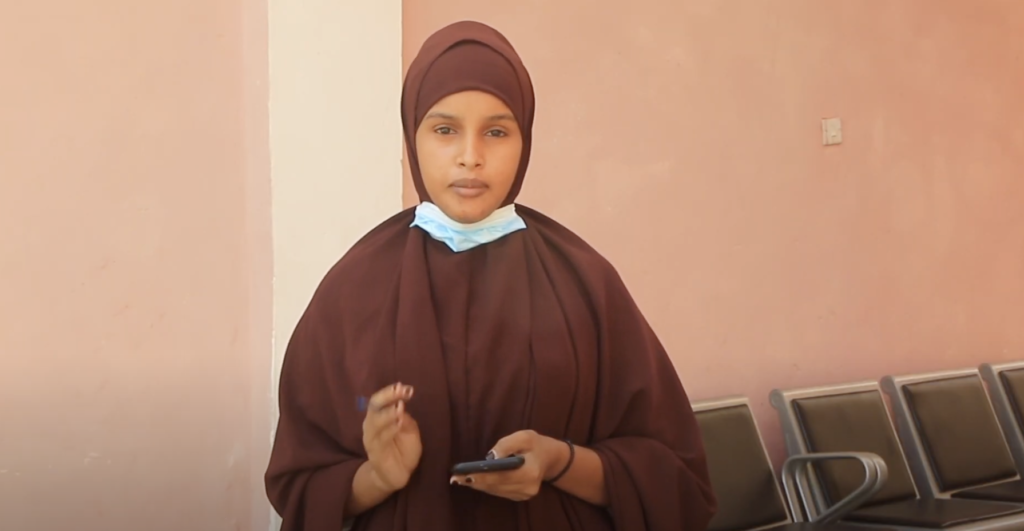
Addressing specific security concerns faced by female journalists
Women journalists, in particular, face additional challenges and threats in Somalia. Hence, the training sessions focused on addressing specific security concerns faced by female journalists, including mitigation of online and physical harassment and safety procedures during field assignments.
Hanad Ali Guled, the SJS Secretary of Training, highlighted the inclusion of trauma sessions in the training, which was a novel addition due to the scarcity of qualified psychotherapists working with journalists to address emotional, social, or mental issues.
“Journalists who cover traumatic events such as violence, disasters and other situations involving human pain often require to know how to care themselves and support each other,” Guled emphasised.
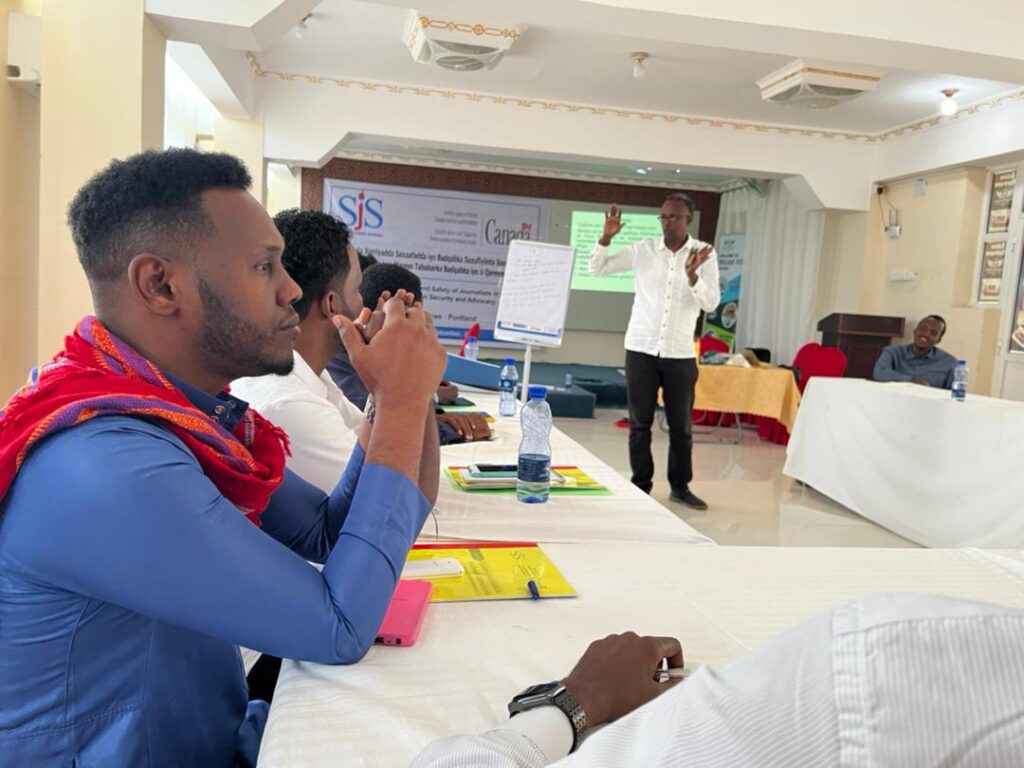
Journalists in regions like Gedo, situated on the Somali border with Kenya and Ethiopia, face unique hardships caused by violent conflict and severe humanitarian crises. Naima Abdi Mohamed, a 23-year-old journalist reporting for the local online platform Voice of Somali People, shed light on the challenges faced by journalists in the region.
“Our region has experienced numerous hardships, from climate shocks to conflicts. The local community faces extreme conditions, and we journalists are part of that community,” she explained.
Naima and other local journalists had the opportunity to benefit from the empowering training.
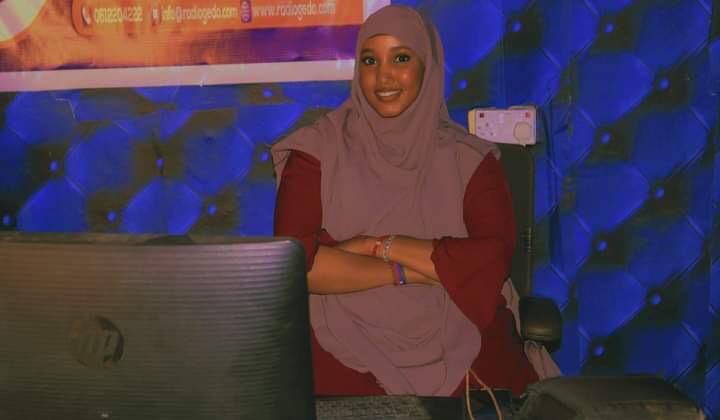
“Firstly, it allowed me to be trained alongside my male colleagues, which was a rarity in the past. Secondly, the training covered both physical and digital aspects, helping me understand the risks associated with my job, including online platforms,” Naima expressed. “Our training focused on the best safety and security practices, enabling me and my colleagues to work confidently and securely.”
Mumin acknowledges that the achievements attained thus far owe their existence to two critical factors: the support from Canada and the invaluable collaborations within the local community. He expresses deep gratitude for the generous support received from Canada, which, coupled with the collective efforts of local collaborators, paved the way for these remarkable successes. “I am truly thankful for the support extended by Canada and our local partners, as their contributions have been instrumental in our accomplishments,” he emphasizes appreciatively.
With safety and security risks increasingly affecting the professional duties of local journalists in Somalia, the training addressed these concerns head-on. The impact of the initiative, backed by Canada Global Affairs, has been profound and tangible on the ground. However, it is crucial to recognize that sustaining and further building upon this impact is a key challenge that needs to be addressed for long-term success and progress in the field.


